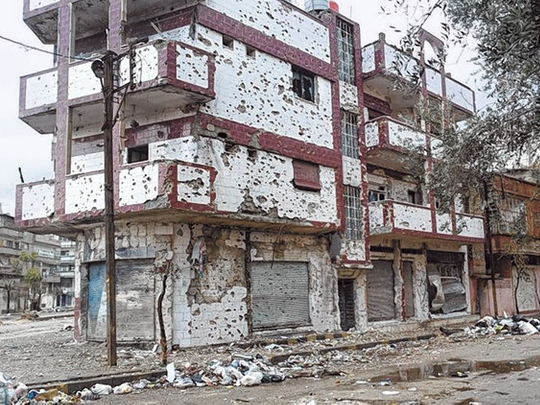
Moscow: Russia's decision not to attend a "friends of Syria" meeting in Tunisia later this week deepens the international community's divide over Syria and raises prospects of a cold-war-style proxy war in the Middle East.
An extended and deteriorating conflict in Syria will in turn have almost certain repercussions in Iran, including increasing chances of an Iran-Israel military confrontation, regional experts say.
With Secretary of State Hillary Rodham Clinton and a number of European foreign ministers set to attend the Arab League-hosted meeting in Tunis on Friday, Russia's and potentially China's absence will make even more remote the possibility of any meaningful action on Syria in the Security Council.
Disunity at the international level will pave the way to more violence in Syria — and greater risks for the region, experts add.
"The standoff in the Security Council and Russia's determination to stand by its last meaningful ally in the Middle East means greater chaos in Syria," says James Phillips, senior research fellow for Middle Eastern affairs at the Heritage Foundation in Washington. "Arab countries and some European countries are going to find ways to arm a disjointed opposition, and violence is going to ratchet up."
A hardening East-West divide over Syria could also have repercussions for the Iranian crisis, given Iran's close ties to the regime of President Bashar Al Assad. With relations between Iran and the international community at a delicate moment as the two sides consider a return to talks on Iran's nuclear program, an East-West split would very likely make a diplomatic breakthrough on Iran all the more difficult.
Hardening of stance
And Iran will take Russia standing by Al Assad as a green light to stand tough against the West, Phillips adds.
"Iran is likely to harden its position if it thinks it can depend on Russia," he says. "Iran is likely to believe it can depend on Russia to help it fend off pressure from the West on the nuclear issue. And that," he adds, "can't help but increase the chances of an Iran-Israel war."
Russia announced on Tuesday it would not attend the "Friends of Syria" meeting organised by the Arab League because the Syrian government is not included. In Beijing, China said it had received an invitation but that the matter required "further studying."
Arab League countries say the Tunis meeting will focus on finding ways to meet the humanitarian needs of the Syrian people, who continue to come under attack from Syrian government forces. But the question of arming the Syrian opposition is also likely to come up, analysts say.
In the US, some members of Congress are calling on the Obama administration to work with other countries to find ways for Syrians under siege from their own government to acquire arms and defend themselves.
The administration has voiced opposition to arming the anti-government groups, but coordinated statements on Tuesday by both the White House and State Department, which cited "additional measures" if Syria does not relent in its crackdown, signalled that its opposition could be softening.
The Arab League meeting will take place even as Iran and a group of world powers consider restarting talks on Iran's nuclear program.
Oil price
But some experts believe that, just as Russia is standing by its ally Syria, Moscow is also likely to stand with Tehran — even if it increases the risks of a broader regional conflict.
Military strikes on Iran's nuclear installations and retaliation by Iran "would send oil prices through the roof, and who does that benefit? Russia," says Phillips, "whose principal export is oil."
Russia is making moves suggesting it does not want to be seen as blocking the way to some resolution of the Syrian conflict.












